Cancellation Letter Samples
-
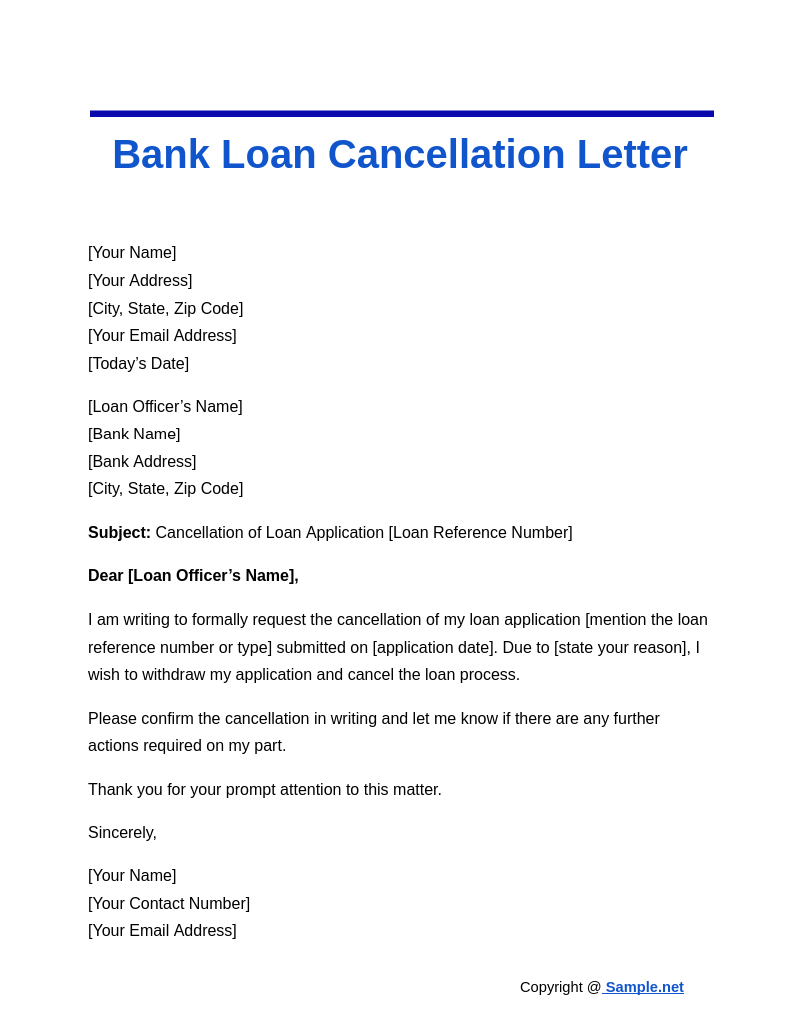
Bank Loan Cancellation Letter
download now -
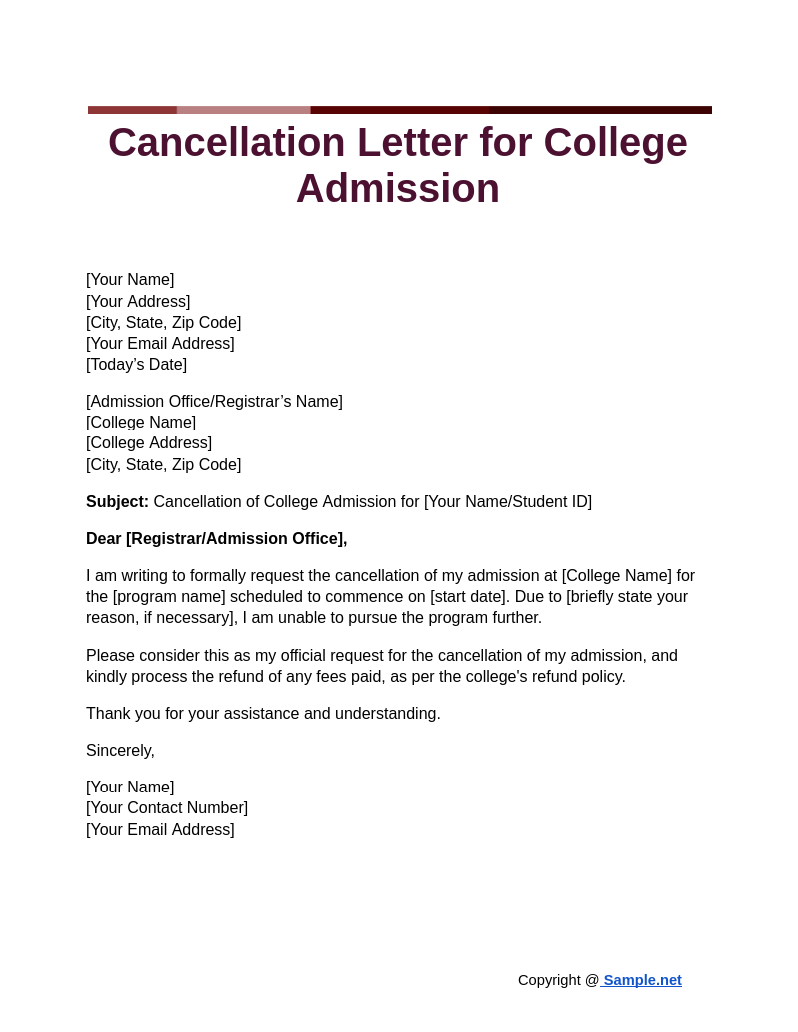
Cancellation Letter for College Admission
download now -
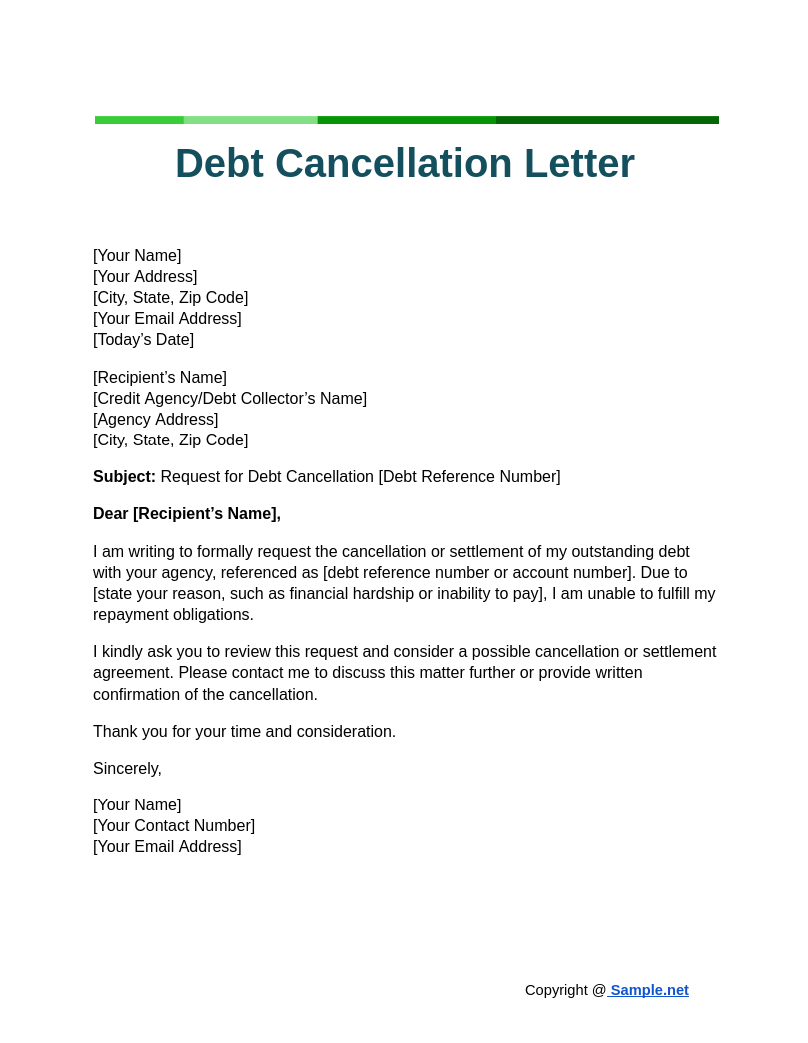
Debt Cancellation Letter
download now -
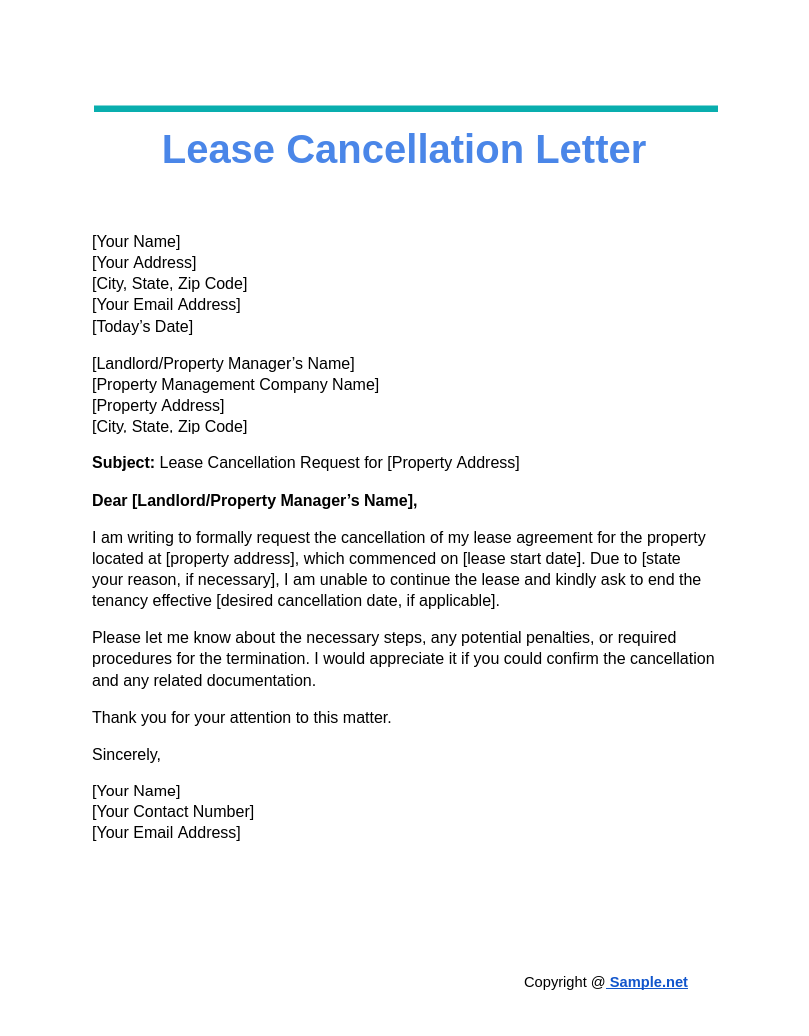
Lease Cancellation Letter
download now -
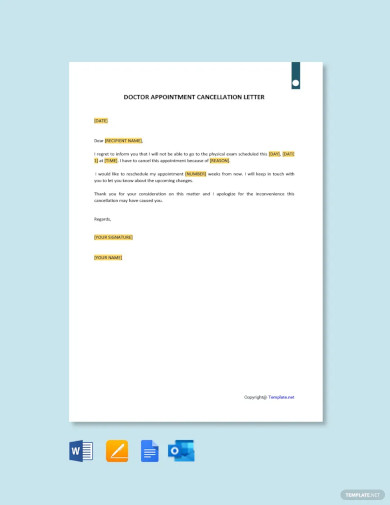
Doctor Appointment Cancellation Letter Template
download now -
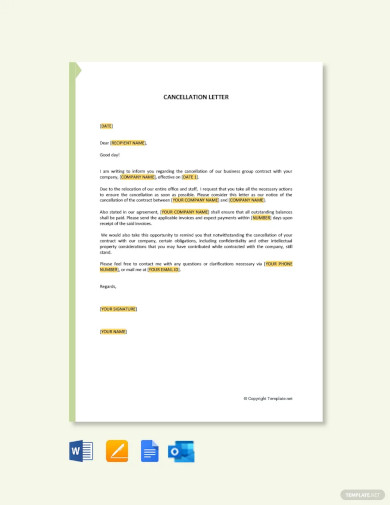
Free Cancellation Letter Template
download now -
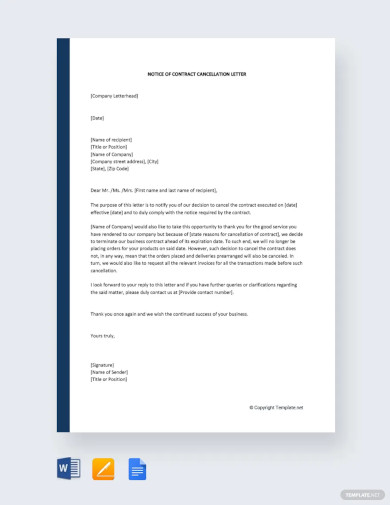
Notice Of Contract Cancellation Letter Template
download now -
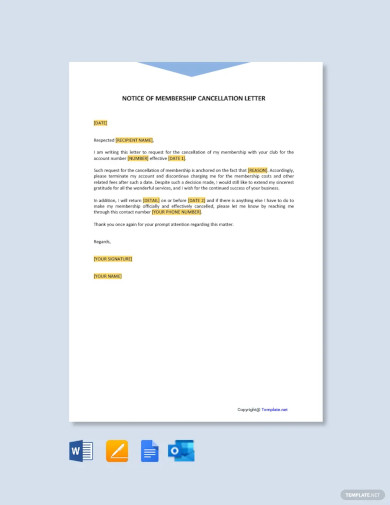
Free Notice Of Membership Cancellation Letter Template
download now -
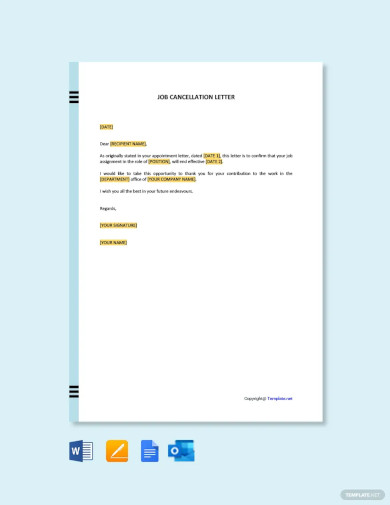
Job Cancellation Letter Template
download now -
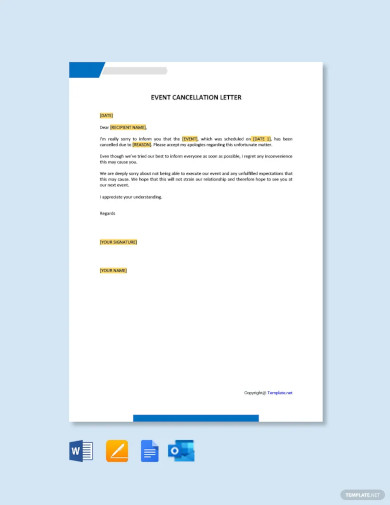
Free Event Cancellation Letter Template
download now -
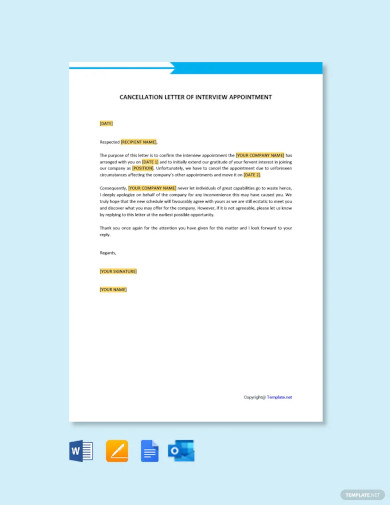
Cancellation Letter of Interview Appointment Template
download now -
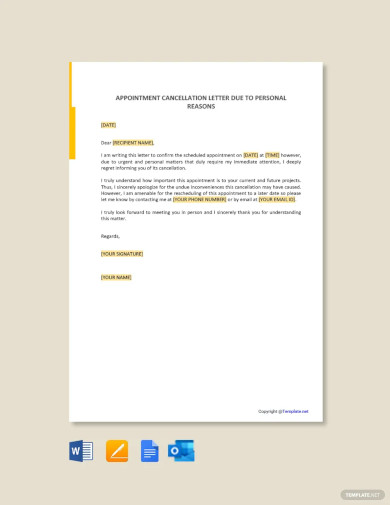
Free Appointment Cancellation Letter due to Personal Reasons Template
download now -
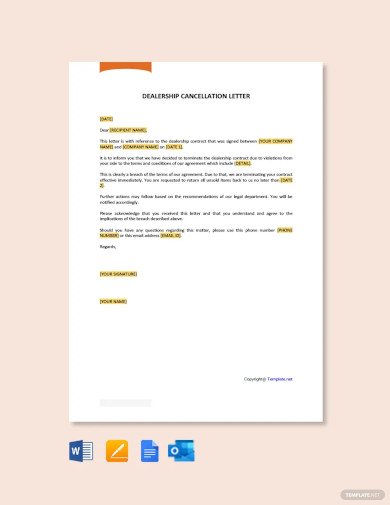
Free Dealership Cancellation Letter Template
download now -
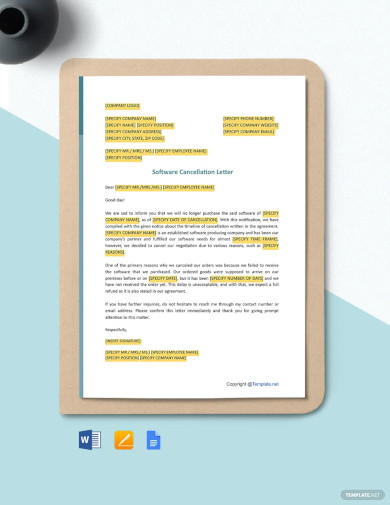
Free Software Cancellation Letter Template
download now -
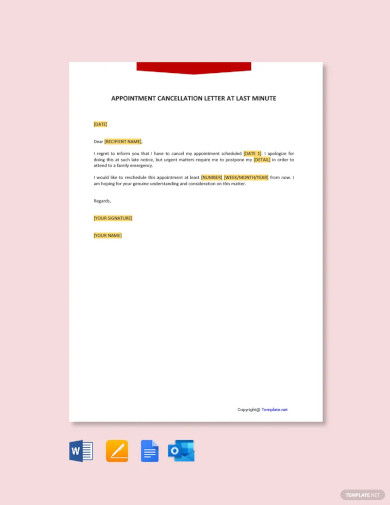
Free Appointment Cancellation Letter at Last Minute Template
download now -
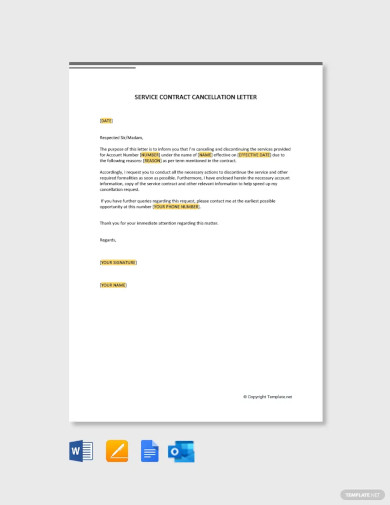
Service Contract Cancellation Letter Template
download now -
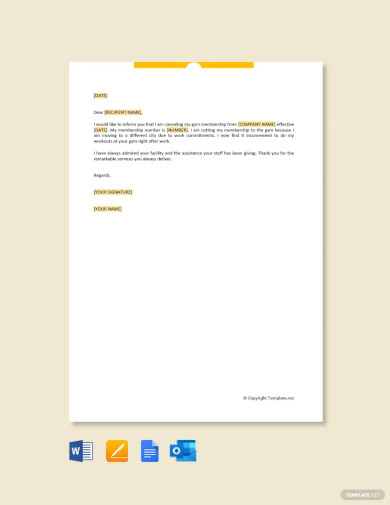
Free Membership Cancellation Letter Template
download now -
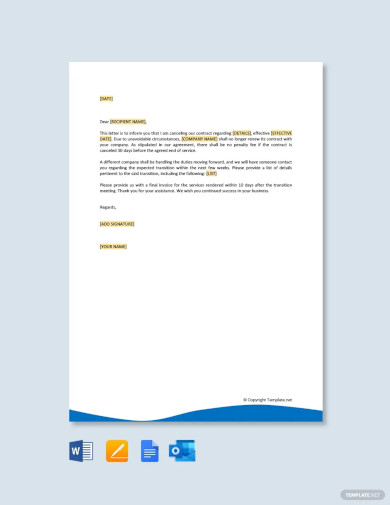
Free Contract Cancellation Letter Template
download now -
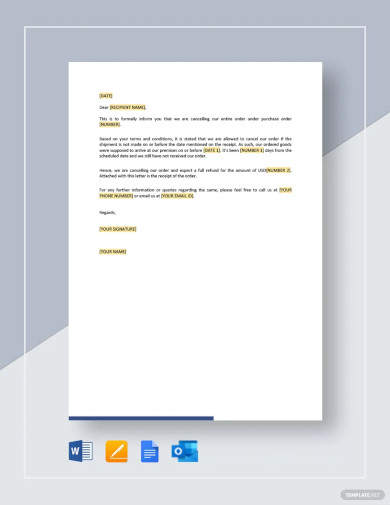
Free Purchase Order Cancellation Letter Template
download now -
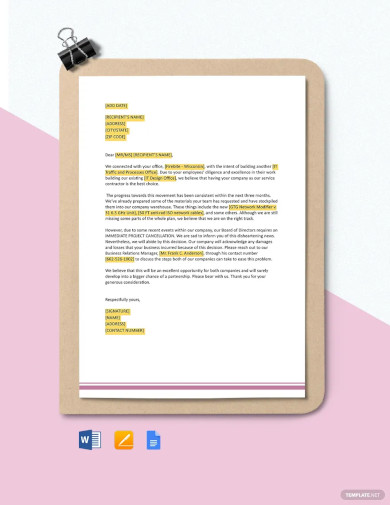
Free IT Project Cancellation Letter Template
download now -
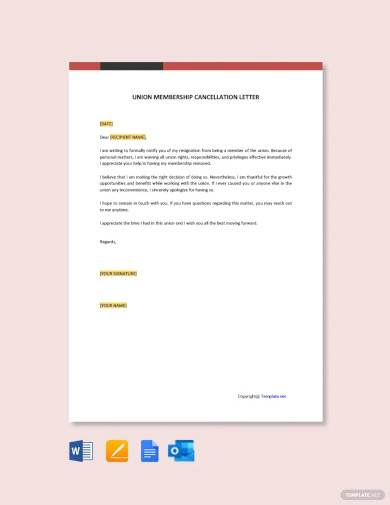
Free Union Membership Cancellation Letter Template
download now -
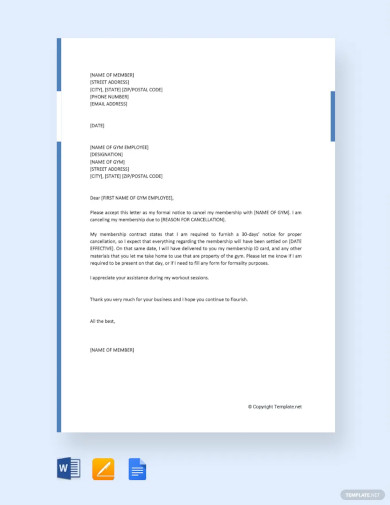
Free Gym Membership Cancellation Letter Template
download now -
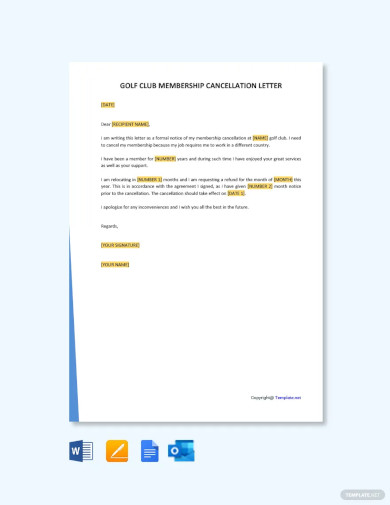
Free Golf Club Membership Cancellation Letter Template
download now -
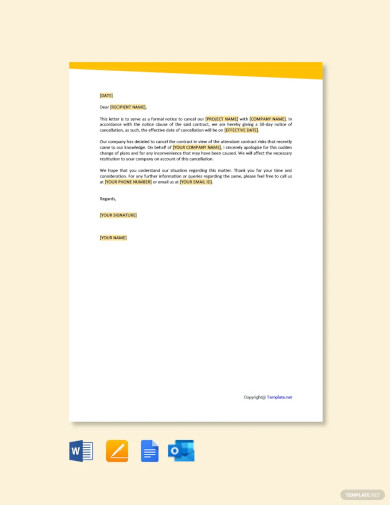
30 Day Notice of Cancellation Letter Template
download now -

Cancellation of Appointment Letter Template
download now -
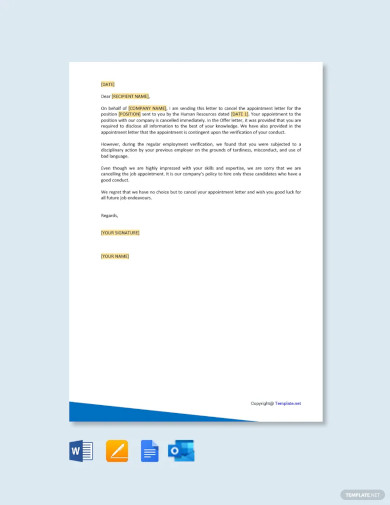
Free Cancellation Of Job Appointment Letter Template
download now -
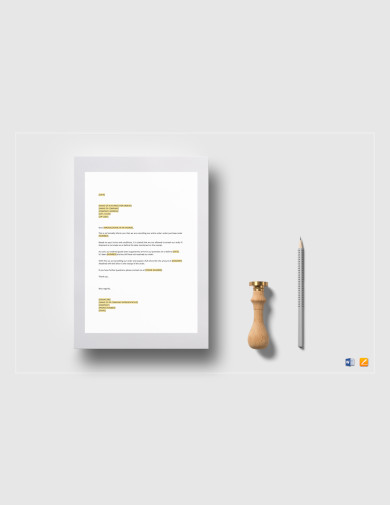
Purchase Order Cancellation Letter Template
download now -
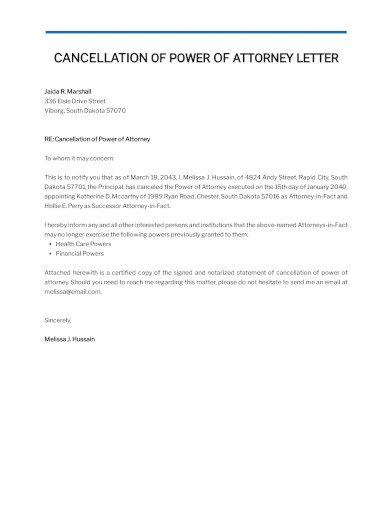
Cancellation of Power of Attorney Letter Template
download now -

Sample Cancellation Letter
download now -
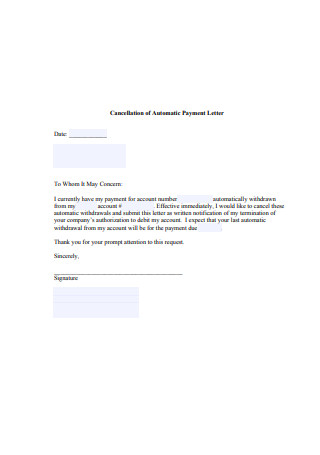
Cancellation Service Payment Letter
download now -
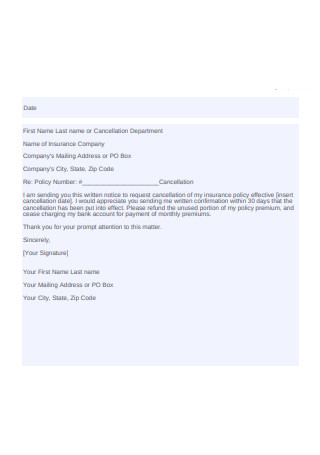
Insurance Job Cancellation Letter Sample
download now -
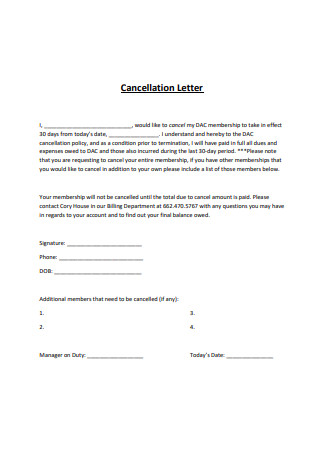
Cancellation Business Letter Sample
download now -
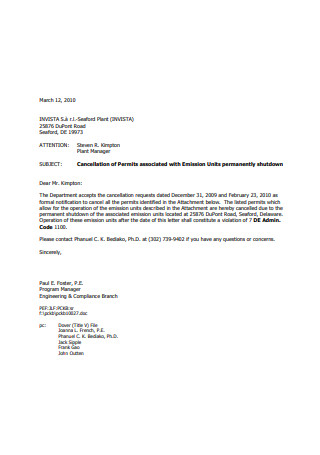
Cancellation Gym Letter Example
download now -
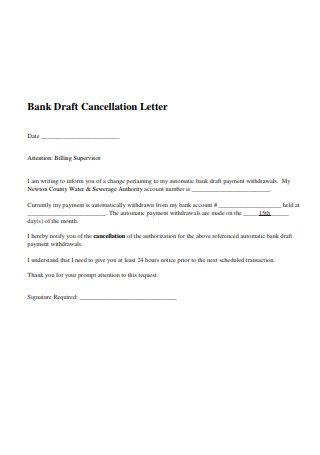
Bank Reservation Cancellation Letter
download now -
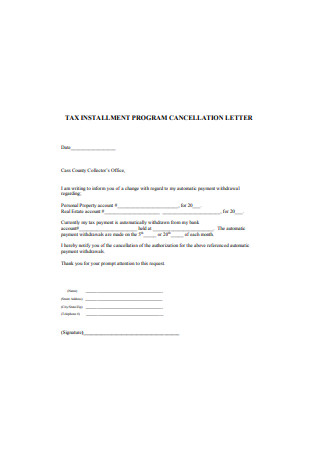
Application Cancellation Letter
download now -
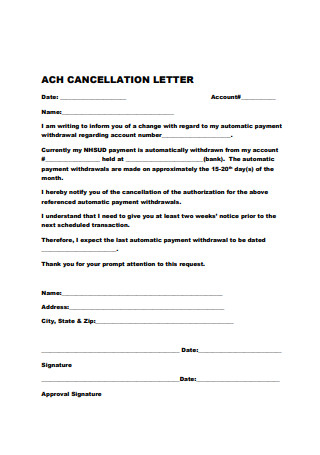
Purchase Order Cancellation Letter
download now -
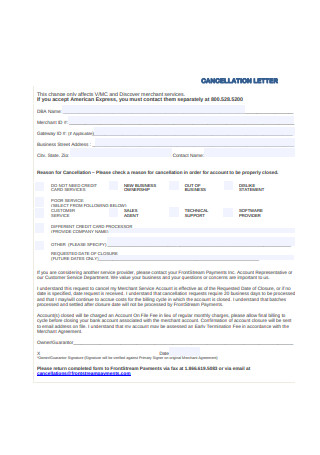
Real Estate Cancellation Letter
download now -
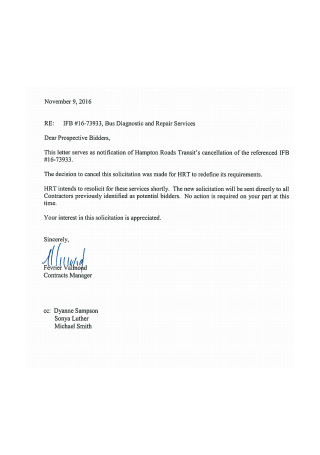
Cancellation Loan Letter Format
download now -
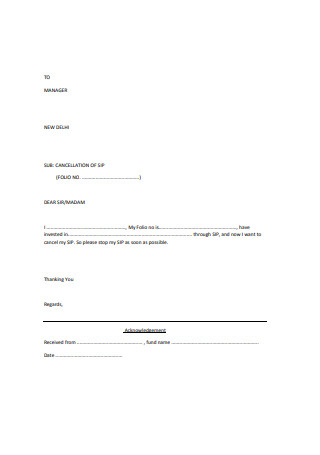
Sample Vendor Cancellation Letter
download now -

Sample Health Insurance Contract Cancellation Letter
download now -
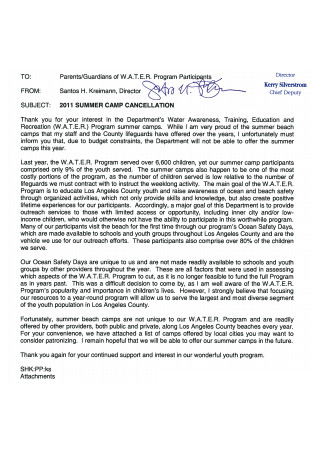
Summer Appointment Cancellation Letter
download now -
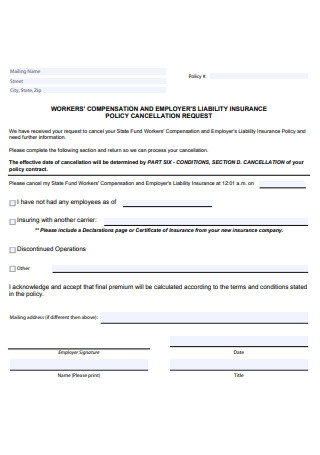
Cancellation Refund Request Letter
download now -
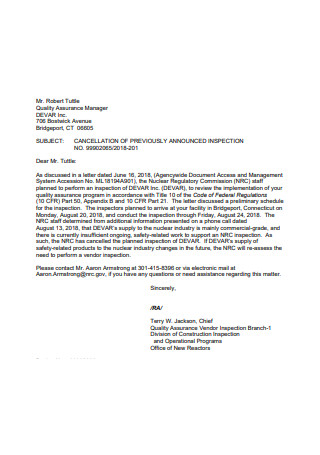
Cancellation Car Insurance Letter
download now -
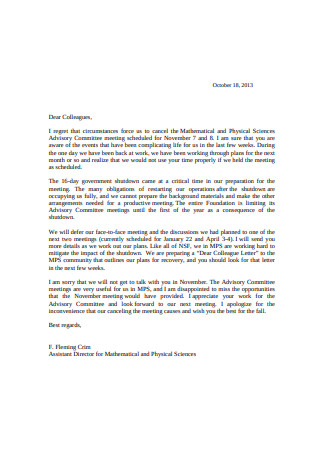
Event Meeting Cancellation Letter
download now -
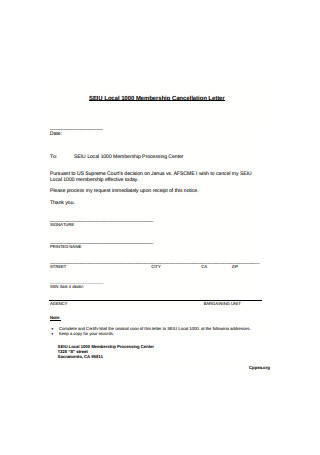
Membership Customer Cancellation Letter
download now -
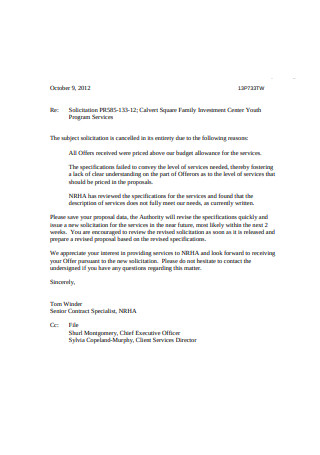
Medical Aid Cancellation Letter
download now -
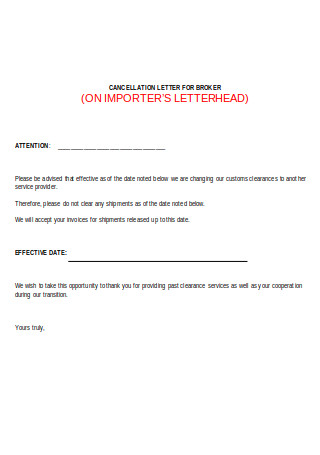
Credit Card Cancellation Letter
download now
FREE Cancellation Letter s to Download
Cancellation Letter Format
Cancellation Letter Samples
What is a Cancellation Letter?
The Purpose of Cancellation Letters
Types of Cancellation Letters
How to Write a Cancellation Letter
FAQS
How should I address a cancellation letter?
Do I need confirmation of cancellation?
What happens if my cancellation letter is ignored?
What details should I include in a service cancellation letter?
How long should a cancellation letter be?
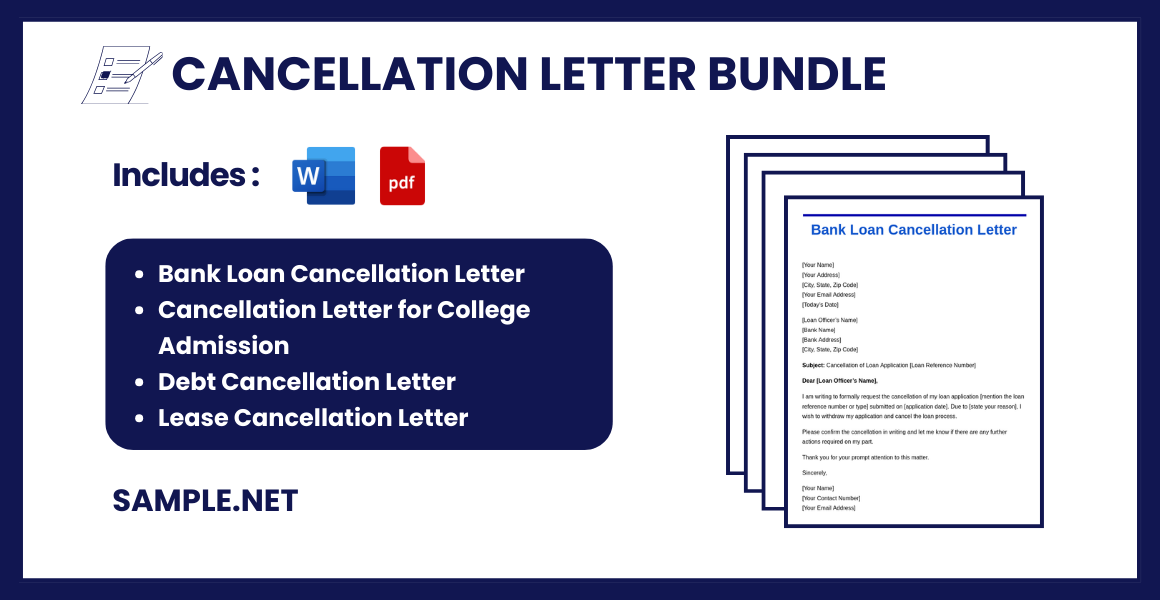
Download Cancellation Letter Bundle
Cancellation Letter Format
[Your Name]
[Your Address]
[City, State, Zip Code]
[Your Email Address]
[Today’s Date]
[Recipient’s Name]
[Recipient’s Designation]
[Company/Organization Name]
[Recipient’s Address]
[City, State, Zip Code]
Subject: Request for Cancellation of [Specify Service/Contract/Order]
Dear [Recipient’s Name],
I am writing to formally request the cancellation of [mention the specific service, contract, or order] that I am currently enrolled in or have subscribed to with your company. The details of the agreement are as follows:
- Contract/Service/Order Number: [Insert number]
- Date of Commencement: [Insert date]
- Reason for Cancellation: [Briefly explain your reason, if necessary]
I kindly ask you to acknowledge this request and take the necessary actions to terminate the [service/contract/order] effective [desired cancellation date, if applicable]. Please let me know if there are any specific steps I need to follow to ensure a smooth cancellation process. Additionally, I would appreciate it if you could confirm the cancellation in writing, along with any necessary information related to refunds or final payments.
Thank you for your attention to this matter. I look forward to receiving confirmation of the cancellation at your earliest convenience.
Sincerely,
[Your Name]
[Your Contact Number]
[Your Email Address]
What is a Cancellation Letter?
Before we discuss how to write a cancellation letter, we must first grasp the concept of cancellation.
Canceling something would mark the end of a formal or informal agreement between two or more parties. Perhaps you aren’t satisfied with the lack of group programs and activities at your local gym. A membership retention report by the IHRSA shows the likelihood of social interactions affecting gym membership renewals at a significant rate. Gym cancellations are reportedly higher by 56% among members who only exercise with gym equipment as opposed to those who work out in groups. When this happens, you can opt to withdraw your membership by submitting a cancellation letter. You can also see more on Letters of Job Termination.
A cancellation letter expresses one’s intention to discontinue a subscription service, deal, or event. It’s meant to inform a recipient about your plans to terminate or cancel something that you have agreed upon in the past. And because we consider these documents as official business correspondence, the contents of the letter must be as specific and concise as possible. That way, you can communicate without room for misunderstandings. The recipient may also respond to your message with a confirmation letter as a way of acknowledging your request. Any refunds or cancellation charges will then follow.
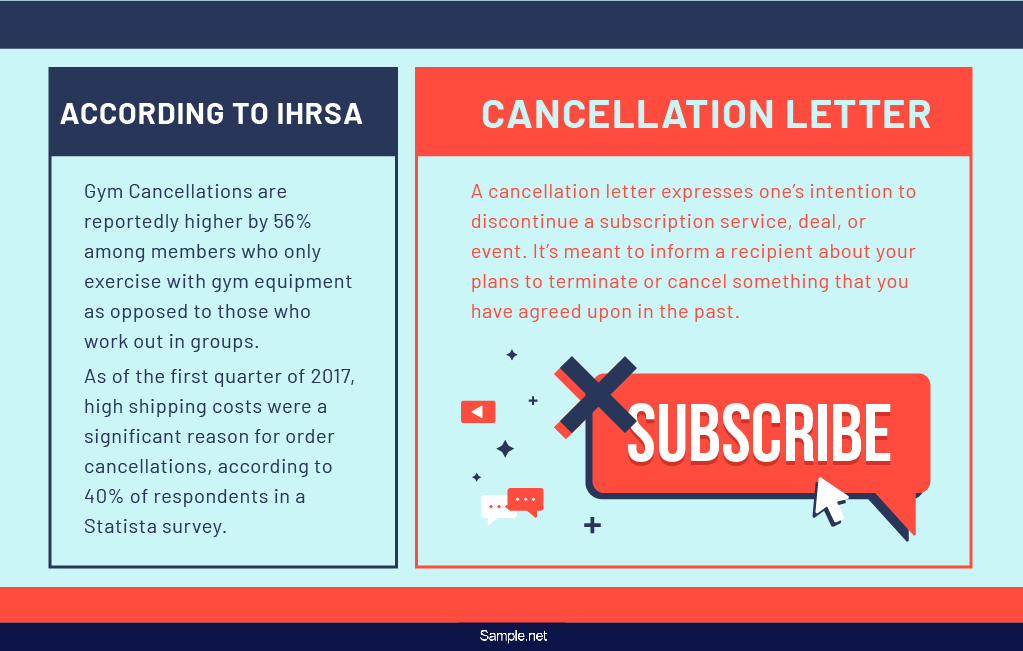
The Purpose of Cancellation Letters
Look at things from the perspective of a business owner. When someone cancels their membership at your fitness center, you’ll want to why they are canceling and what you can do to boost your retention rate. As a consumer, it also keeps you out of trouble when billing season starts. You can also see more on Immediate Letter of Resignation.
Now you must be wondering—when do you send a cancellation letter?
When paying for a product or service, it’s only natural for one to expect nothing but top-quality solutions in return. But companies that fail to provide what they promised are bad news to consumers. Imagine paying hundreds of dollars for a year-long gym membership, only to find poorly working or malfunctioning equipment at the center. So if it’s not worth the money they’re milking you of, then you’re free to leave as long as you abide by the rules of your contract. Carefully reading the terms and conditions of the binding agreement is crucial to ensure that you’re taking precautionary measures to address the issue. The same goes for tenants of a housing unit that wish to discontinue their lease despite being a few months short of their rental agreement. You can let your landlord know about your wishes to terminate the contract by outlining your intentions in a cancellation letter.
Types of Cancellation Letters
Unforeseen circumstances, upsetting product quality, and poor services are just some of the reasons that drive customers to cancel their contracts with a business. Consumers have the right to refuse service if it fails to meet their expectations. But because it’s unethical (and often illegal) to withdraw from a fixed arrangement without giving proper notice, for us to terminate an agreement or discontinue service, letters of cancellation are necessary.
A cancellation letter can come in many forms. Regardless of your reason for writing, it functions to make your intent known to the recipient. Some common instances in which cancellation letters play a part include:
How to Write a Cancellation Letter
Telling people about your plans to cancel a membership, appointment, or event can be tricky. You know what your plans are, but struggle to relay it without getting misunderstood. It’s a common problem that hinders most people from taking action, even forcing some not to act at all. But with the right tips, you can strike the proper tone in making your intentions known to the concerned parties. You can also see more on Authorization Letter.
So, whether you need one now or have been thinking about pushing through with your cancellation for some time, the following guidelines in letter writing should come in handy.
1. Use the Right Format
The first step to writing a business letter is knowing how to structure it appropriately. Because we use a cancellation letter to address a severe matter, following a business letter format should be appropriate. As you would with any business correspondence, the letter must consist of a heading, body, and closing. You can start by noting the details that one can find in a business letterhead, such as your address, the date, and your recipient’s address, followed by a personal salutation. Using a direct and formal tone is necessary to spell out your thoughts in as few words as possible. You’ll also want to incorporate a simple language so as not to leave room for confusion.
Additionally, don’t miss the chance to review the letter for spelling, grammar, or information errors before sending the final copy to your recipient. Correcting these mistakes before your readers get to find them is crucial in maintaining the right tone and structure for your cancellation letter.
2. Be Honest
It’s never a requirement to state your reason for making a cancellation request. Some people cancel due to personal reasons that they would rather keep to themselves. You might feel pressured to come up with a lie that constitutes a valid reason, but the truth is, all that will really matter to your recipient is your initiative to provide notice. But if you do feel the need to make your reason known, be sure to stick to the facts.
Discuss your case briefly and include actions that you expect the recipient to take in response to your request. For example, if you want the cancellation of your mobile plan to take effect by the 15th of January, no charges should reflect in your credit account after the said date. Being specific will always come as an advantage when dodging sales pitches and persuasive language that businesses do to keep you from canceling. It must be short yet clear enough for the recipient to understand your decision and close the dealing without question.
3. Include the Necessary Information
It would help if you could supply information that the company may use to identify your account. Apart from your personal details, it could be a reference number to an online order, a check for full payment of a remaining balance, or even an official receipt indicating a downpayment. If you need a refund for something, you already paid for, provide the date and amount you expect to receive it. Enclosing this information in your letter helps streamline the cancellation procedure for all parties to benefit from. Any other details you wish to add to the body of the letter must be pertinent to your primary purpose. Otherwise, if you have complaints or suggestions that you want to raise, you might want to compose a separate letter to express your thoughts.
4. Apologize for the Inconvenience
Cancellations can leave financial damage to the other party. It seldom happens, but when it does, you can only imagine how disruptive last-minute cancellations can be to their operations. Thus, you need to be considerate enough to acknowledge the inconvenience you have caused with your decision. It’s never a good feeling to cancel important plans at short notice, so the least you can do is apologize for the trouble, and provide some sort of consolation for it. Closing the letter with a polite and friendly tone is one way to cool any steam caused by the situation at hand. It’s also best to remain cooperative throughout the cancellation process to make the job easier for everyone involved. You can also see more on Acceptance Letter.
5. Attach Supporting Documents
If necessary, you can provide any form of evidence to prove your right to cancel. Look for a specific condition or period that addresses the possibility of termination. It can be a particular clause from your business agreement or a fine print indicated at the bottom part of an invoice. Doing so will help you protect your legal rights in the event of a dispute. So if a seller refuses to provide a refund for the purchased item, you can file a complaint against the said party and use the documentation to support your claims. That is why you must never hesitate to ask for your copy of the receipt or contract used whenever you transact with a business.
6. Send It ASAP
A bonus tip you might find useful is to write and deliver your cancellation letter as early as possible. If you’re having guests over for a major event, doing so is a must. You don’t want people to have their tickets and accommodations already booked by the time they receive your letter. Not only is it a waste of their time and money, but it will also affect their perceptions of you. Giving immediate notice will also provide them with the chance to re-adjust their schedules and pursue other plans they might have canceled for yours. But if you don’t think you can get your letter out on time, you can resort to emails, text messages, and phone calls as an alternative.
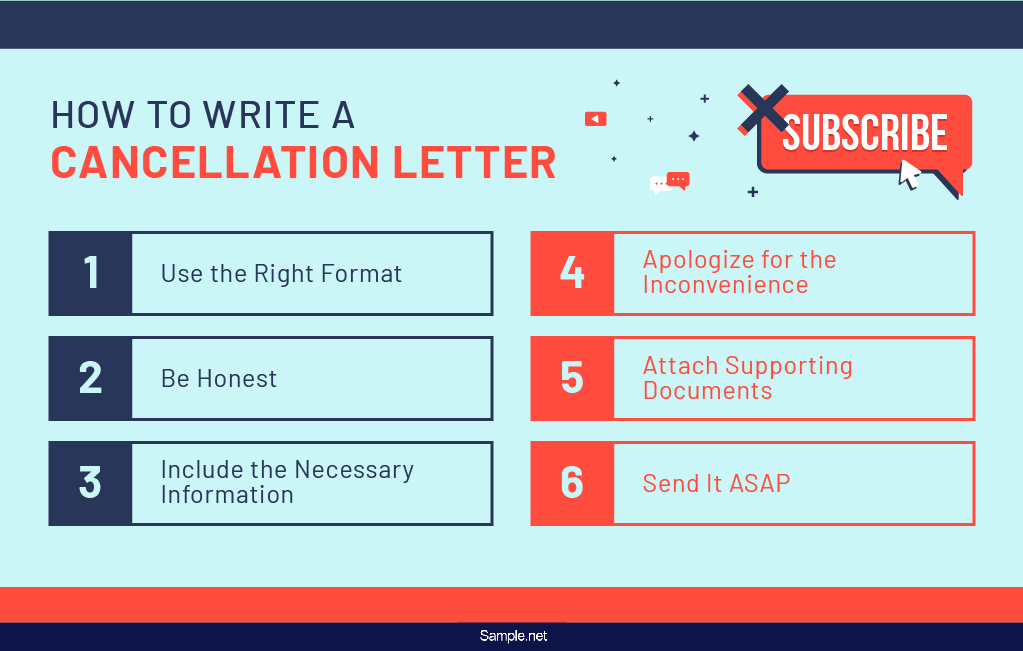
FAQS
How should I address a cancellation letter?
Address the letter using formal salutations like “Dear [Recipient’s Name]” or “To Whom It May Concern.” Use professional language throughout the letter. Ensure that the recipient’s address and details are correctly mentioned to avoid delivery errors.
Do I need confirmation of cancellation?
Yes, it’s important to request confirmation of cancellation in writing. This confirmation acts as evidence that your request was acknowledged. It can be useful for future reference or in case of disputes related to the cancellation.
What happens if my cancellation letter is ignored?
If your cancellation letter is not acknowledged, send a follow-up letter. Wait for a reasonable time, usually a week, before escalating the matter. If the recipient still doesn’t respond, you may consider contacting customer service, a legal advisor, or using other formal means to enforce cancellation. You can also see more on Professional Reference Letters.
What details should I include in a service cancellation letter?
Include the service or agreement name, account or reference number, and specific cancellation date. Provide personal identification details like your full name and address. Mention any pending actions, such as the return of equipment, and request written confirmation of the cancellation.
How long should a cancellation letter be?
A cancellation letter should ideally be one page long. It should be concise and clear, focusing on key information such as the service details, cancellation date, and any pending matters. Avoid unnecessary details to maintain professionalism and ensure clarity. You can also see more on Thank You Letters.
